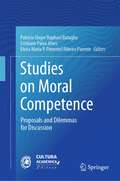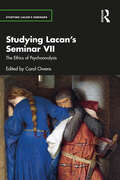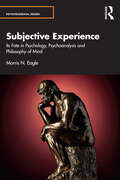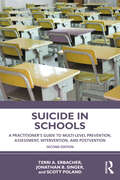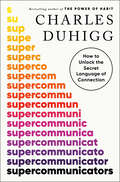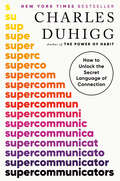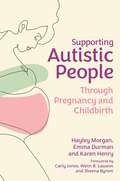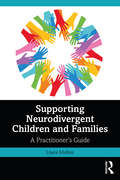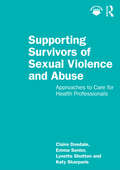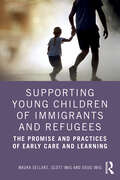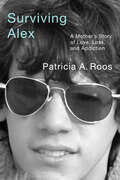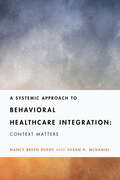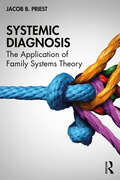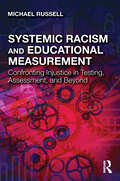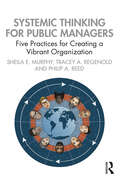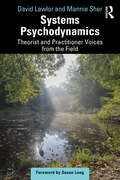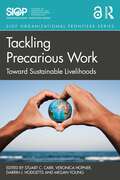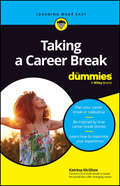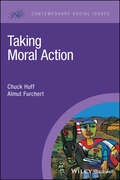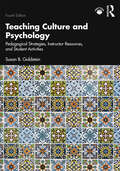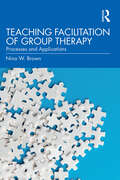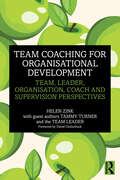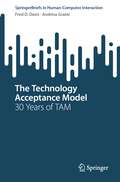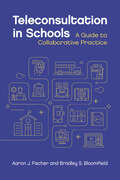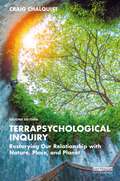- Table View
- List View
Studies on Moral Competence: Proposals and Dilemmas for Discussion
by Patricia Unger Raphael Bataglia Cristiane Paiva Alves Elvira Maria P. Pimentel Ribeiro ParenteThis book shows how to use discussions of moral dilemmas as a strategy to develop moral competence in children and youth in educational environments using the Konstanz Method of Dilemma Discussion (KMDD). This method was developed by the German psychologist Georg Lind (1847-2021), who defines moral competence as an ability to solve problems and conflicts based on moral principles or values, through reflection, dialogue and deliberation, instead of using force, violence, deception and manipulation. According to Lind, this ability can be developed in children and youth through KMDD. The book has two parts. The first part brings together an original chapter written by Georg Lind about his decades of research on assessment and education of moral competence, and other 13 chapters written by different authors analyzing the theoretical foundations of moral development and moral competence as psychological constructs and their applications to different aspects of social life,as well as empirical research analyzing the application of different methods of dilemma discussion in educational contexts. The second part presents 20 moral dilemmas to be used in dilemma discussion sessions.Studies on Moral Competence: Proposals and Dilemmas for Discussion is the English edition of a book originally published in Portuguese for the Brazilian market and will be of interest to teachers and researchers interested in learning about the theoretical foundations and possible applications of an effective method to develop moral competence in educational environments. The translation was done with the help of artificial intelligence. A subsequent human revision was done primarily in terms of content.
Studying Lacan’s Seminar VII: The Ethics of Psychoanalysis (Studying Lacan's Seminars)
by Carol OwensStudying Lacan’s Seminar VII offers a contemporary, critically informed set of analyses of Lacan’s ethics seminar and astute reflections about what Lacan’s ethics offer to the field of psychoanalytic thought today. The volume interrogates the seminar with fresh voices and situated curiosities and perspectives, making for a compellingly exciting range of explorations of the crucial matters related to an ethics of psychoanalysis. The chapters question and tease out the paradoxes Lacan draws attention to in his seminar of 1959–1960, and in addition, they offer radical engagements with the seminar in light of theories of racism, inequality, capitalism, education, and subjectivity. The key elements in Lacan’s seminar are explained, debated, and reconsidered with Antigone, das Ding, and the inevitable “ne céder pas sur son désir ” duly unpacked, examined, and ruminated upon. Studying Lacan’s Seminar VII will be of interest to psychoanalytic scholars and students of Lacanian psychoanalysis, as well as psychoanalytic therapists and analysts. It will also be of interest to scholars and students of politics, philosophy, and studies at the intersections of racism, film, feminism, sociology, gender, and queer theory.
Subjective Experience: Its Fate in Psychology, Psychoanalysis and Philosophy of Mind (Psychological Issues)
by Morris N. EagleMorris N. Eagle explores the understanding and role of subjective experience in the disciplines of psychology, psychoanalysis, and philosophy of mind.Elaborating how different understandings of subjective experience give rise to very different theories of the nature of the mind, Eagle then explains how these shape clinical practices. In particular, Eagle addresses the strong tendency in the disciplines concerned with the nature of the mind to overlook the centrality of subjective experience in one's life, to view it with suspicion, and to reduce it to neural processes. Describing examples of research in which subjective experience is a central variable, Eagle provides an outline of a model in which the dichotomy of conscious and unconsious is supplemented by subjective experience as a continuum. This book is essential reading for psychoanalysts, psychoanalytic psychotherapists, psychologists and anyone wishing to gain a deeper understanding of the importance of theories of the mind to therapeutic practice.
Suicide in Schools: A Practitioner's Guide to Multi-level Prevention, Assessment, Intervention, and Postvention
by Terri A. Erbacher Jonathan B. Singer Scott PolandThe extensively updated second edition of Suicide in Schools provides school-based professionals with practical, easy-to-use guidance on developing and implementing effective suicide prevention, assessment, intervention, and postvention strategies. The Suicide in Schools Model provides readers with clear, step-by-step guidelines on how to work proactively with school personnel and community professionals, how to screen, assess, and monitor suicide risk, create collaborative safety plans, and plan for reentry after a suicidal crisis. The authors expand this new edition with detailed case examples and innovative approaches such as upstream prevention strategies, usable handouts, and internet resources to effectively work with youth facing a suicidal crisis as well as students, families, and school staff who have suffered a suicide loss. Updates include expanding the literature on cyberbullying and social media, the higher risk of suicide in ethnoracial minoritized youth and LGBTQ+ students, and the role of suicide in school violence. This book is essential reading for school-based administrators, crisis team members, and mental health professionals as well as for outside providers who work collaboratively with school districts.
Supercommunicators: How to Unlock the Secret Language of Connection
by Charles DuhiggFrom the Globe and Mail and New York Times bestselling author of The Power of Habit, an investigation of what makes conversations work, and how we can all learn to be supercommunicators at work and in our lives.We all know people who seem capable of connecting with almost anyone. They are the ones we turn to for advice, the ones who ask deep questions but who also seem to hear what we are trying to say. What do they know about conversation that makes them so special? And what can they tell us about how communication really works?Supercommunicators, Charles Duhigg argues, understand—some by intuition, some by hard-won experience—that there is a science to how human beings connect through words. They understand that whenever we speak, we're actually participating in three distinct conversations: What is this really about? How do we feel? And who are we? They know the importance of recognizing—and then matching—each kind of conversation, and how to hear the complex emotions, subtle negotiations and hidden beliefs that color and inform everything we say. Our pasts, our values, our affiliations—our identities—shape every discussion we have, from who will pick up the kids to how we want to be treated at work.With his trademark insight and clarity, Duhigg shows readers how to recognize these three conversations—and teaches us the skills we need to navigate them more successfully. Communication, he argues, is a superpower. By bringing readers into jury deliberations and fraught CIA recruitments, into Netflix's company-wide conversations about equity and the writers' room of The Big Bang Theory, we learn why some people are able to make themselves heard—and to hear others—so clearly. We learn how to recognize and leverage the hidden layers that lurk beneath every conversation. In the end, we learn a simple but powerful lesson: We can connect with anyone, as long as we understand how conversations work.
Supercommunicators: How to Unlock the Secret Language of Connection
by Charles DuhiggNEW YORK TIMES BESTSELLER • From the author of The Power of Habit, a fascinating exploration of what makes conversations work—and how we can all learn to be supercommunicators at work and in life&“A winning combination of stories, studies, and guidance that might well transform the worst communicators you know into some of the best.&”—Adam Grant, author of Think Again and Hidden PotentialCome inside a jury room as one juror leads a starkly divided room to consensus. Join a young CIA officer as he recruits a reluctant foreign agent. And sit with an accomplished surgeon as he tries, and fails, to convince yet another cancer patient to opt for the less risky course of treatment. In Supercommunicators, Charles Duhigg blends deep research and his trademark storytelling skills to show how we can all learn to identify and leverage the hidden layers that lurk beneath every conversation.Communication is a superpower and the best communicators understand that whenever we speak, we&’re actually participating in one of three conversations: practical (What&’s this really about?), emotional (How do we feel?), and social (Who are we?). If you don&’t know what kind of conversation you&’re having, you&’re unlikely to connect. Supercommunicators know the importance of recognizing—and then matching—each kind of conversation, and how to hear the complex emotions, subtle negotiations, and deeply held beliefs that color so much of what we say and how we listen. Our experiences, our values, our emotional lives—and how we see ourselves, and others—shape every discussion, from who will pick up the kids to how we want to be treated at work. In this book, you will learn why some people are able to make themselves heard, and to hear others, so clearly.With his storytelling that takes us from the writers&’ room of The Big Bang Theory to the couches of leading marriage counselors, Duhigg shows readers how to recognize these three conversations—and teaches us the tips and skills we need to navigate them more successfully.In the end, he delivers a simple but powerful lesson: With the right tools, we can connect with anyone.
Supporting Autistic People Through Pregnancy and Childbirth
by Hayley Morgan Emma Durman Karen HenryThis comprehensive and accessible guide is for every birthing and health professional looking to improve their care during pregnancy, birth, and aftercare for autistic women. With a distinct lack of scientifically approached work in this area, this much-needed book takes an intersectional, feminist approach and covers the background of modern birth practices and autism as a diagnosis.With intersectionality as a core feature, the impact of cultural differences, underdiagnoses, stigma, and stereotypes amongst ethnic minorities is also included. It discusses how pain functions in the autistic brain as well as co-occurring conditions such as alexithymia, chronic pain, epilepsy, and Ehlers-Danlos Syndrome.This multidisciplinary author team includes two well-established autism experts, and an experienced midwife and lecturer who provides invaluable birthing insight, as well as approaches for sensation management during birth, insider knowledge on midwifery protocols, and accessible tools for autistic pregnant people and families to use.
Supporting Neurodivergent Children and Families: A Practitioner's Guide
by Lhara MullinsSupporting Neurodivergent Children and Families presents an innovative blueprint using academic literature, research and theory, to provide a best practice approach in equipping practitioners to support neurodivergent children and their families.The knowledge and insight provided in this book allows practitioners to effectively create supportive environments and plan appropriate practice responses, whilst never changing the child. By altering the system perspective and transcending the physical boundaries of space where the interaction occurs, a supportive environment is created, thus providing more positive outcomes. The blend of practice experiences, tangible case studies and theory prompts the reader to critically reflect on their practice and potentially integrate new, innovative changes to their approach.This comprehensive and thought-provoking read is not only ideal for students and professionals who interact with neurodiverse families, but also practitioners and educators looking to alter their practical approach to understanding neurodivergent children and their families.
Supporting Survivors of Sexual Violence and Abuse: Approaches to Care for Health Professionals
by Claire Dosdale Emma Senior Lynette Shotton Katy SkarparisThis textbook provides practical guidance to enable health professionals to support survivors of sexual violence. It gives insight into the complex and wide-ranging nature and experience of sexual violence, barriers to disclosure, and explores the implications for survivors, health professionals and healthcare organisations.An evidence-based resource, this book provides information, guidance and signposting for all those who might receive disclosures of sexual violence, challenging perceptions, stigma and judgement. As well as discussing disclosure of recent experiences, it takes into account that life events may trigger the re-surfacing of prior experiences. The book also operates as a practical tool, prompting professionals to reflect on their own clinical experience of dealing with disclosures of sexual violence. The chapters look at the full breadth of sexual violence and abuse, including rape and sexual assault, child sexual abuse, harassment and stalking, exploitation, trafficking, conflict situations, traditional practices and sexual violence in LGBTQAI+ communitites.Enabling readers to develop the necessary knowledge and understanding to inform their practice, this book is a comprehensive resource for all health professionals, across primary and secondary care. It is also a valuable text for those taking post-registration courses in sexual health, specialist community and public health nursing, district nursing, mental health and children’s nursing among others. Reflection sections can be used to support professional registration revalidation.
Supporting Young Children of Immigrants and Refugees: The Promise and Practices of Early Care and Learning
by Maura Sellars Scott Imig Doug ImigThis text offers a comprehensive portfolio of approaches to support young children with refugee backgrounds. It covers trauma-informed pedagogies, transitioning to school, authentic inclusion, play, social and emotional learning, and intergenerational trauma.In early childhood centres around the world, teachers and directors can be uncertain of how to meet the needs of newly arrived children. Based on empirical research in five countries, this book offers insights from early childhood educators who are working hard to support families and young children with refugee and asylum-seeker experiences. It illustrates the link between theory and practice and the importance of developing culturally sensitive classroom strategies to effectively support the emotional and cognitive needs of multilingual, multicultural students whose common experiences may only include displacement, trauma, and loss. Rather than offering a measure for ‘success,’ this book shares the knowledge and experience of practitioners who understand the work and the very particular circumstances of these children’s lives. The authors bring these perspectives together in order to inspire other professionals who face this challenging work, encouraging the reader to reflect, to consider how relevant some of the ideas may be in their own contexts, and to contemplate the principles which allow their professional actions to make a difference.This book is an essential resource for early childhood educators and leaders who want to ‘open the door’ to genuinely inclusive, empathetic, and supportive practice. It will be of great interest to researchers and postgraduate students in the fields of early childhood and primary education.
Surviving Alex: A Mother’s Story of Love, Loss, and Addiction
by Patricia A. RoosIn 2015, Patricia Roos’s twenty-five-year-old son Alex died of a heroin overdose. Turning her grief into action, Roos, a professor of sociology at Rutgers University, began to research the social factors and institutional failures that contributed to his death. Surviving Alex tells her moving story—and outlines the possibilities of a more compassionate and effective approach to addiction treatment. Weaving together a personal narrative and a sociological perspective, Surviving Alex movingly describes how even children from “good families” fall prey to addiction, and recounts the hellish toll it takes on families. Drawing from interviews with Alex’s friends, family members, therapists, teachers, and police officers—as well as files from his stays in hospitals, rehab facilities, and jails—Roos paints a compelling portrait of a young man whose life veered between happiness, anxiety, success, and despair. And as she explores how a punitive system failed her son, she calls for a community of action that would improve care for substance users and reduce addiction, realigning public health policy to address the overdose crisis.
A Systemic Approach to Behavioral Healthcare Integration: Context Matters (Fundamentals of Clinical Practice With Couples and Families Series)
by Dr. Nancy Breen Ruddy PhD Dr. Susan H. McDanielThis book provides clinicians, consultants, and healthcare administrators with a roadmap to establishing a systemic, patient-centered, family-oriented behavioral health service that is integrated into a healthcare setting. Healthcare that goes beyond biomedical issues to address our whole biopsychosocial selves, produces better outcomes for patients and families. Integrating behavioral health into medical settings requires an understanding of the interplay of multiple systemic layers in American healthcare. The existing literature on integration largely fails to address the "big picture" of integrated services and systems, including operations, clinical processes, and financial sustainability elements.A Systemic Approach to Behavioral Healthcare Integration summarizes the literature on the impact of integrating behavioral health care into medical settings, on the role of families in health maintenance and chronic disease management, and on team science and applying family systems theory/relational science to the teams that are now essential to healthcare.
Systemic Diagnosis: The Application of Family Systems Theory
by Jacob B. PriestSystemic Diagnosis: An Application of Family Systems Theory helps marriage and family therapists incorporate theory-driven assessment and diagnosis into their practice, demonstrating how they can diagnose systems, not just individuals. This introductory textbook argues that theory and diagnosis are key to providing excellent care in family therapy. Rooted in family systems theory, Jacob B. Priest offers readers a model to diagnosis the history, structure, and boundaries of family systems. Chapters begin by looking at traditional and relational models of diagnosis before diving into systemic diagnosis. Readers are introduced to the EPIC assessment and guided on how to use it in their practice. Filled with case studies throughout, the book also includes digital content so students can practice a diagnosis process rooted in family systems theory. Designed to be used on COAMFTE accredited programs, this book is essential for couple and family therapy students who are taking courses in assessment and mental health diagnosis and treatment.
Systemic Racism and Educational Measurement: Confronting Injustice in Testing, Assessment, and Beyond
by Michael RussellSystemic Racism and Educational Measurement provides a theoretical and historical reckoning with racism and oppression produced through educational measurement and research methodology. As scholars and professionals in the testing, measurement, and assessment of human learning and performance work to exorcise race sciences, white supremacy, and other injustices from the field’s research and practice, new insights are needed into their root causes. This book is the first to posit that the theory of the White Racial Frame was and continues to be applied to the foundations, process, dissemination, and use of educational measurement, leading to instruments, findings, and decisions that perpetuate the racialized social structure of our nation. Even among well-meaning stakeholders who aim to improve humanity and address inequities, the White Racial Frame shapes the field’s research questions, the methods utilized, the data valued, the interpretations made, and the language used throughout. Students and scholars of educational measurement, testing, and psychometrics will find invaluable clarifications of terminology, concepts, and theories integral to understanding systemic barriers in the field; explications of educational measurement’s core purposes and its influence by the White Racial Frame; and a series of alternate frames, theories, and epistemologies intended to guide educational measurement toward anti-racism and increased fairness.
Systemic Thinking for Public Managers: Five Practices for Creating a Vibrant Organization
by Sheila Murphy Tracey Regenold Philip ReedOffering a pathway to vibrant organizations, this book integrates systems thinking, critical thinking, and design thinking, and provides the tools needed to proactively apply them in the social systems where we live and work. Systemic thinking—the combination of systems thinking, critical systems thinking, and design thinking—provides a way of addressing the complexity of problems faced by public sector managers. Far too often systemic thinking has been discussed theoretically rather than practically. This book changes that, enabling public sector managers and leaders to connect staff, partners, and stakeholders in the pursuit of thoughtfully designed and responsive service. Clearly written and designed to be put to immediate use on the job, each chapter provides a discussion of one specific practice. Included are guiding principles, a case study, relevant practical tools, and suggestions of for additional practice and reading.Using this book, managers of social systems such as public welfare, healthcare, public schools and libraries, housing and community development, and students of public administration will gain a deeper understanding of organizational systems and design, and a new toolkit to fortify their own organizations.
Systems Psychodynamics: Theorist and Practitioner Voices from the Field
by David Lawlor Mannie SherThrough a series of in-depth interviews with Tavistock thinkers across three generations, this volume illustrates the practice and application of the systems psychodynamics paradigm to organisational development consultancy, research and training. Across 28 stimulating interviews with a group of international consultants, interviewees present a critical appraisal of the systems psychodynamics paradigm and its application to present-day social and organisational difficulties. By using a narrative interpretive method, the interviewers attend to the historical, psychosocial and biographical dynamics of the interviewees’ approaches and methods of work, and address several areas of organisational consultancy. These include organisational design, the division of labour, levels of authority and reporting relationships; the nature of work tasks, processes and activities; primary tasks and the inevitable unconscious dynamics within systems and individuals. The multi-disciplinary approaches of the interviewees will interest managers, policymakers, consultant practitioners and researchers to understand the variety of applications of systems psychodynamics methodologies.
Tackling Precarious Work: Toward Sustainable Livelihoods (SIOP Organizational Frontiers Series)
by Stuart C. Carr Veronica Hopner Darrin J. Hodgetts Megan YoungTackling precarious work has been described by the United Nations (UN)’s International Labour Organization (ILO) as the main challenge facing the world of work. In this ground-breaking book, leading applied research scholars, advocates, and activists from across the globe respond to this challenge by showing how Industrial and Organizational (I/O) psychology has a significant contribution to make in humanity moving away from precarious work situations towards sustainable livelihoods. Broken down into four key parts on Sustainable Livelihoods, Fair Incomes, Work Security and Social Protection, the book covers a multitude of topics including the role of poor pay, lack of work-related security, social protection for human health and wellbeing, and interventions and policies to implement for the future of work. The volume offers a detailed look into useful and effective ways to tackle precarious work to create and maintain sustainable livelihoods. This curated collection of 22 chapters considers the broader relationships between previous research work and issues of human security and sustainability that affect workers, families, communities, and societies. Each chapter expands the present understandings of the world of precarious work and how it fits within broader issues of economic, ecological, and social sustainability. In addition to I/O psychologists in research, practice, service and study, this book will also be useful for organizational researchers, labor unions, HR practitioners, fair trade, cooperative, and civil society organizations, social scientists, human security analysts, public health professionals, economists, and supporters of the UN SDGs, including at the UN.
Taking A Career Break For Dummies
by Katrina McGheeTaking a career timeout could be the window of opportunity you’ve been looking for Taking A Career Break For Dummies shows you that a career break could be life-changing. Career breaks give us a chance to pause to identify opportunities and dreams, focus on the things we’ve been missing, and develop new skills. This book empowers you to take the leap into your next chapter. There are dozens of reasons you might want to do it, but whatever your circumstance, this friendly Dummies guide will help you value your own well-being, give yourself permission to grow and explore, and reclaim your time, your life, and your happiness. Develop your plan for taking a break from your career and for transitioning back when you’re ready Set a budget for your break, create a realistic timeline, and make it happen Access practical tools and resources to help you on your career break journey Build a positive mindset so you can enjoy your break and return to your career feeling renewedFor anyone looking for a new direction, feeling burned out, or longing to reignite that inner spark, Taking a Career Break For Dummies is a must. If you’re looking for help structuring your planned time off, you’ll also love the hands-on guidance and examples inside.
Taking Moral Action (Contemporary Social Issues)
by Chuck Huff Almut FurchertProvides a systematic framework for understanding and shaping moral action Taking Moral Action offers a timely and comprehensive overview of the emerging field of moral psychology, introducing readers to one of the most vibrant areas of research in contemporary psychology. With an inclusive and interdisciplinary approach, authors Chuck Huff and Almut Furchert incorporate a wide range of scholarly traditions, philosophical theories, empirical findings, and practical moral writings to explore the complex network of influences, contexts, and processes involved in producing and structuring moral action. Integrating key empirical and theoretical literature, this unique volume helps readers grasp the different aspects of both habitual and intentional acts of moral action. Thematically organized chapters examine moral action in contexts such as evolution, moral ecology, personality, moral identity and the self, moral reason, moral emotion, and more. Each chapter features a discussion of how neuroscience underlies or supports the influence and process addressed. Throughout the book, historical stories of moral action and examples of humanistic and experiential traditions of moral formation highlight what is possible, relevant, and appropriate in taking moral action in a variety of settings. Explores the relationships between moral psychology, empirical psychology, philosophy, and theology Considers the various ways that individuals experience and construct moral identity Emphasizes the practical application of the science of morality in service of moral good Reviews cultural, organizational, group, and social influences to investigate how individuals actively shape their moral environment Discusses the role of emotions in morality and considers if individuals can change or train their emotional responsesTaking Moral Action is essential reading for those new to the field and experienced practitioners alike. Containing extensive references and links to further readings, Taking Moral Action is also an excellent textbook for college and university courses in areas such as psychology, ethics, theology, philosophy, anthropology, and neuroscience.
Teaching Culture and Psychology: Pedagogical Strategies, Instructor Resources, and Student Activities
by Susan B. GoldsteinThe fourth edition of Teaching Culture and Psychology (previously Cross-Cultural Explorations) provides an array of carefully designed instructor resources and student activities that support the construction and implementation of courses on culture and psychology.Revised and expanded from previous editions, the book enables instructors to use selected activities appropriate for their course structure. Part One explores a variety of pedagogical challenges involved in teaching about culture and psychology and details specific strategies for addressing these challenges. Part Two (instructor resources) and Part Three (student handouts) center around 90 activities designed to encourage students to think critically about the role of culture in a wide range of psychology content areas. These activities are based on current and classic cross-cultural research and take the form of case studies, self-administered scales, mini-experiments, database search assignments, and the collection of content-analytic, observational, and interview data. For each activity, instructors are provided with a lecture/discussion module as well as suggestions for variations and expanded writing assignments. Student handouts are available in this text as well as on the Routledge website as fillable forms.Contributing to the inclusion of cultural perspectives in the psychology curriculum, this wide-ranging book enables instructors to provide students with hands-on experiences that facilitate the understanding and application of major concepts and principles in the study of culture and psychology, making it ideal for cultural psychology, anthropology, sociology, and related courses.
Teaching Facilitation of Group Therapy: Processes and Applications
by Nina W. BrownTeaching Facilitation of Group Therapy explores an extensive range of topics crucial to effective teaching and practice, and will be a valuable resource for instructors of group therapy. With an emphasis on evidence-based methodologies, this book describes proven teaching techniques that foster a dynamic learning environment, facilitate group cohesion, and promote meaningful interventions. The author presents ethical considerations including those that relate to using social media in therapeutic practices, equipping readers with the knowledge to leverage its potential while safeguarding client confidentiality and well-being. This resource presents topics including therapeutic factors and effective interventions, the use of the group leader’s inner development as a guide for therapeutic alliance and group members’ healing, cutting-edge therapeutic AI applications, the role of self-absorption for members and the leader, group dynamics, ethical uses of social media in therapeutic settings, and serves as a comprehensive guide for instructors in the art of teaching group psychotherapy in the modern era. This is an indispensable resource for educators to elevate their expertise in teaching group psychotherapy and prepare clinicians and students by deepening their understanding of group dynamics, and how to employ effective interventions that promote healing and growth in therapeutic settings.
Team Coaching for Organisational Development: Team, Leader, Organisation, Coach and Supervision Perspectives
by Helen ZinkWorking with teams, leading teams and being a member of a team is part of everyday working life for most of us. Through the lens of a team coaching case study, this book considers the development journey of a team and system influences over a three-year period. Readers are invited to walk in the shoes of the team, the team leader, the organisation, the team coach and the coach’s supervision and support networks, providing a unique insight into team coaching and development that goes beyond the traditional focus on the coach’s perspective. Helen Zink uses her considerable experience as a leadership and team growth coach, and leader to illustrate how team coaching interventions can be combined with other disciplines such as positive psychology, change management and strategic implementation in effective ways. The book takes a pracademic approach, showing how theories, models and best practice are applied to a real case and highlighting both the successes and challenges experienced to offer an example for all those involved in team, leadership and organisational development. With it widely recognised that collective leadership and teamwork is needed to deal with the rapidly changing environment organisations find themselves in, this is a timely and important resource for coaches, team coaches, coach supervisors, team leaders, team members, organisational development specialists, change managers, academics and consultants.
The Technology Acceptance Model: 30 Years of TAM (Human–Computer Interaction Series)
by Fred D. Davis Andrina GranićThis SpringerBrief discusses the origins, emergence, evolution, and future of the Technology Acceptance Model (TAM). TAM, simple yet powerful, has been extensively validated, standing as a leading scientific paradigm and a reliable model for explaining, predicting, and improving user acceptance across a spectrum of technological deployments. Over more than three decades since the introduction of TAM, numerous extensions have emerged, incorporating additional variables and collectively referred to as “TAM++”. However, perceived usefulness and perceived ease of use remain the basic beliefs of the core TAM model. The introductory chapter “Once upon a TAM” focuses on the challenging search for a user acceptance crystal ball, showing that it is indeed possible to consistently predict, explain, and improve user acceptance. “Evolution of TAM” traces the model's growth and adaptability, exploring the proliferation of selected TAM-related behavioural intention models, several integrated theoretical approaches, the quest for other behavioural intention antecedents, and TAM’s versatile applications in various contexts. “Revolution of TAM” presents an in-depth systematic review, encompassing a meta-analysis of selected TAM reviews and meta-analyses, and a narrative review of representative primary studies, providing a thorough and extensive understanding of the TAM universe. The epilogue “What will the Future of TAM be Like?” provides insights into its dynamic future. This SpringerBrief concludes with seven actionable principles, serving as a strategic guide for those aiming to customize the TAM++ body of knowledge for application-oriented studies within a particular context. This comprehensive overview of TAM is a valuable source of information for researchers, practitioners, and all interested readers, especially those new to the field.
Teleconsultation in Schools: A Guide to Collaborative Practice (Applying Psychology in the Schools Series)
by Aaron J. Fischer PhD Bradley S. BloomfieldThis practical guide to teleconsulting for school psychology professionals demonstrates how rapid advances in the field can help them expand support for educators, administrators, students, and their families by providing online access to consulting services. As schools adapt to teaching in the era of COVID and beyond, educators and school administrators have an increased need for consultation services via videoconferencing and other technologies. This book provides the first comprehensive introduction to how school psychology professionals can provide effective and culturally-sensitive teleconsultation. The authors describe a step-by-step consulting framework for building productive and collaborative relationships with educators, students, and families, and for troubleshooting any technical or client-related difficulties that arise. This framework includes building rapport with clients, identifying the presenting problem, developing and implementing treatment plans, and performing ongoing evaluations. Case examples illustrate each chapter, and a variety of online infographics are available as learning aids. The book concludes with a consideration of barriers to service, including accessibility, and considers the future promise of teleconsultation in schools.
Terrapsychological Inquiry: Restorying Our Relationship with Nature, Place, and Planet
by Craig ChalquistTerrapsychological Inquiry is a path of storied, imaginative research that takes seriously our intense inner responses to the state of the natural world. This place-rooted approach studies, from the standpoint of lived experience, how the world gets into the heart. Oceans and skies, trees and hills, rivers and soils, and even built things like houses, cities, ports, and planes: How do they show up for us inwardly? How do our moods, feelings, and dreams reflect what happens in the world? Terrapsychological Inquiry evolved over a decade of exploration by graduate students, instructors, ceremonialists, workshop leaders and presenters, and other practitioners of embodied creativity to offer an Earth-honoring mode of storied qualitative inquiry, one that transforms all involved from passive spectators of the doings of the world into active, sensitive participants. Learn how to use this methodology of earthly reenchantment in a variety of settings inside and outside academia and by doing so reenter an animate world. This new edition has been revised throughout and offers fresh insights into how Terrapsychological Inquiry, a field with roots in depth psychology, ecopsychology, and Hermetic philosophy, can also be used as an ecospiritual path. Thoroughly updated with a new chapter and added discussion questions and exercises at the end of each chapter, this introduction to an evolving research methodology will be of great interest to students and scholars of environmental psychology, ecotherapy, and environment and sustainability studies more generally.
